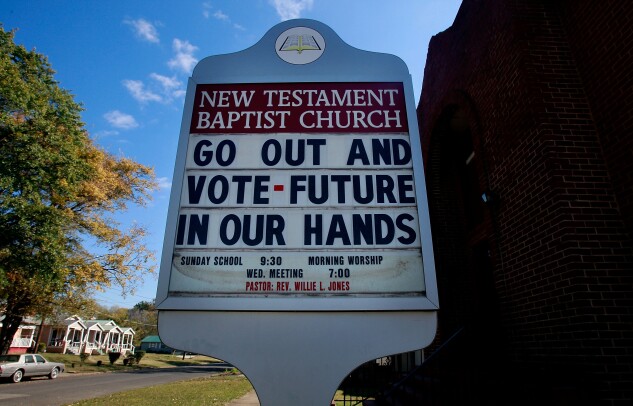Columnist Andrew Leahey says Congress should let churches decide to engage in explicitly political activity in exchange for fewer tax benefits and more financial disclosure requirements.
The IRS recently signaled its retreat from enforcing a ban on churches endorsing candidates—via a consent decree that could trigger a seismic regulatory shift. It couldn’t repeal the tax code provision barring certain nonprofits from engaging in political campaign activity, but it walked back enforcement without overhauling any regulations, rescinding any guidance, or issuing any notices.
It’s a quiet unraveling of the tax code’s fundamental compromise with religious groups: the trade of tax exemption for political neutrality. The message seems clear that some churches are now able express political opinions, but it’s an open question whether our legal infrastructure can administer that ability fairly and responsibly.
The path forward should be to replace the current law’s all-or-nothing framing with a system that distinguishes between partisan campaigning and religious advocacy for a cause—and empowers churches to decide where to land on that spectrum.
The law governing political speech by churches has been in place since the Eisenhower administration. The Johnson Amendment, enacted in 1954, prohibits 501(c)(3) organizations from participating in, or intervening in, any political campaign on behalf of or opposed to a candidate for public office.
The IRS has vacillated between indifference and abdication of their enforcement duty. The agency’s latest posture—opting to interpret a house of worship’s political speech as apolitical—rewrites the law without doing so. This could enable bad actors to escape consequences while good-faith religious organizations operate in uncertainty.
The Johnson Amendment had become too brittle to regulate modern political speech long before the recent consent decree. Sermons didn’t go viral on YouTube and pastors didn’t post their takes on TikTok 70 years ago. A homily on poverty policy today, given in a certain context, can sound like a stump speech. A discussion of family values or immigration can double as an implicit endorsement.
A framework to replace the Johnson Amendment can be simple and straightforward: Let churches speak on political issues that relate directly to a tangible aspect of their religious mission. Sermons on abortion, immigration, or the death penalty would qualify.
But once a church endorses a candidate, fundraises for a campaign, or provides any dimension of in-kind support, it should cross a definitional line with real consequences.
For churches that want to be explicitly political, Congress should establish a new legal category: Religious-Political Entity.
These organizations could engage in electoral activity but would be subjected to limitations—such as an inability to accept tax-deductible donations, the requirement that they disclose their political spending, and strict separation and accounting of charitable versus campaign funds. This would move away from censorship and toward a policy scaffolding that allows religious organizations room to speak, with boundaries.
Before the latest consent decree, the tax code didn’t prohibit churches from engaging in public life, but it attached enough regulatory asterisks to make safe zones uncertain.
Churches could host candidate forums, conduct nonpartisan voter drives, and take stances on policy issues. But the law’s broad prohibition on campaign intervention kicked in the moment a pastor’s language got too sharp or a voter guide became too directed. This would leave well-intended churches guessing whether they may have crossed a poorly defined line.
The IRS’s shifting approach through a consent decree invites a new kind of chaos—one where the law isn’t as relevant as your lawyers’ creativity or your church’s political slant.
The decree is only legally binding on the parties in that case. It neither alters the Johnson Amendment nor officially applies to churches nationwide. The decree’s ongoing salience turns on judicial discretion, abided by one court, one case, and one interpretation at a time.
The consent decree replaces enduring policy with a temporary workaround, and precedent with expediency. It informs those in the tax-exempt sector they’re free to push boundaries but shouldn’t expect guidance on where those boundaries are or how far they can exceed them. This amounts to total policy ambiguity.
Returning to the status quo before this latest action likely isn’t tenable either. The Johnson Amendment was an uneasy balance and an unworkable system long term. But if the goal is to protect both free expression and the integrity of the tax system, we can’t leave that task to one-off decrees and regulatory silence. Congress must step in.
Religious organizations should be free to speak with guardrails, but freedom without structure invites uncertainty and abuse. And yet, structure without clarity begets selective enforcement.
The future demands a statutory framework that recognizes and defines the line between issue advocacy rooted in religious tenets and partisan political campaigning. That line should spell out what’s prohibited and what happens when the line is crossed.
A new legal category for Religious-Political Entities would allow for full political speech freedom, with reduced tax benefits, more disclosure obligations, and strict fiscal firewalls between charitable and campaign activity.
If we don’t set clear boundaries through legislation and public oversight, the courts—in conjunction with the most politically assertive churches and a politicized IRS—will end up setting them for us.
Andrew Leahey is a tax and technology attorney, principal at Hunter Creek Consulting, and practice professor at Drexel Kline School of Law. Follow him on Mastodon at @andrew@esq.social
Read More Technically Speaking
To contact the editors responsible for this story:
Learn more about Bloomberg Tax or Log In to keep reading:
See Breaking News in Context
From research to software to news, find what you need to stay ahead.
Already a subscriber?
Log in to keep reading or access research tools and resources.

